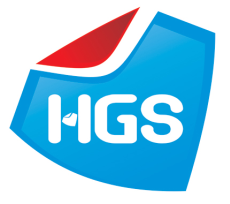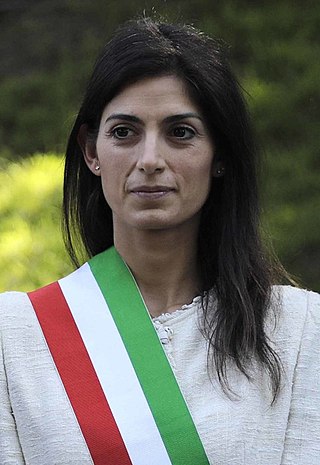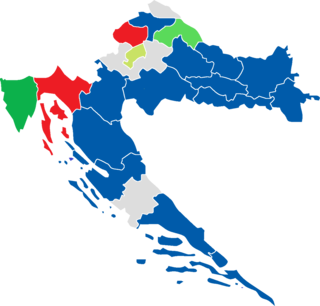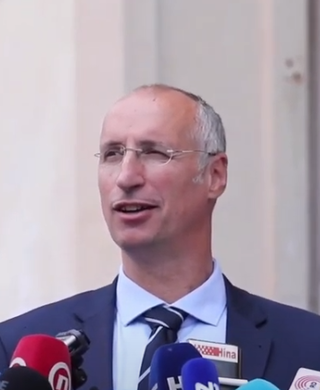The politics of Croatia are defined by a parliamentary, representative democratic republic framework, where the Prime Minister of Croatia is the head of government in a multi-party system. Executive power is exercised by the Government and the President of Croatia. Legislative power is vested in the Croatian Parliament. The Judiciary is independent of the executive and the legislature. The parliament adopted the current Constitution of Croatia on 22 December 1990 and decided to declare independence from Yugoslavia on 25 May 1991. The Constitutional Decision on the Sovereignty and Independence of the Republic of Croatia came into effect on 8 October 1991. The constitution has since been amended several times. The first modern parties in the country developed in the middle of the 19th century, and their agenda and appeal changed, reflecting major social changes, such as the breakup of Austria-Hungary, the Kingdom of Serbs, Croats and Slovenes, dictatorship and social upheavals in the kingdom, World War II, the establishment of Communist rule and the breakup of the SFR Yugoslavia.
Regular elections in Croatia are mandated by the Constitution and legislation enacted by Parliament. The presidency, Parliament, county prefects and assemblies, city and town mayors, and city and municipal councils are all elective offices. Since 1990, seven presidential elections have been held. During the same period, ten parliamentary elections were also held. In addition, there were nine nationwide local elections. Croatia has also held three elections to elect members of the European Parliament following its accession to the EU on 1 July 2013.
Elections in Hungary are held at two levels: general elections to elect the members of the National Assembly and local elections to elect local authorities. European Parliament elections are also held every 5 years.
Željko Kerum is a Croatian entrepreneur and politician who served as Mayor of Split from 2009 to 2013. He also owned the supermarket chain Kerum until it folded in 2012.

Croatian Civic Party is a right-wing political party in Croatia. It was established in September 2009 by Željko Kerum, an entrepreneur and mayor of Split after he won the mayoral elections as an independent candidate. During his mayoral campaign, he often criticized political parties. Between 2009 and 2013, it was the ruling party in the city of Split in coalition with the far-right Croatian Pure Party of Rights (HČSP). For the 2011 elections, the party formed a pre-election coalition with the Croatian Democratic Union for the two Dalmatian constituencies and won 2 seats in the parliament for himself and his sister Nevenka Bečić. In the parliamentary 2015 elections, the party won only 2234 votes in the two Dalmatian constituencies and became a non-parliamentary party

Municipal elections were held in Rome on 26–27 May and 9–10 June 2013 to elect the Mayor of Rome and 48 members of the City Council, as well as the fifteen presidents and more than 400 councillors of the 15 municipi in which the municipality is divided.

Local elections were held in Croatia on 19 May 2013, with the second round held on 2 June where necessary.

The 2013 local elections were held in Split, Croatia on 19 May and 2 June 2013.

Snap municipal elections were held in Rome on 5 and 19 June 2016, to elect the Mayor of Rome and 48 members of the City Council, as well as the fifteen presidents and more than 400 councillors of the 15 municipi in which the municipality is divided.
Nevenka Bečić is a Croatian entrepreneur and politician. She was president of the Split city council from 2009 to 2013 and a member of the Croatian Parliament from 2011 to 2015. She is mostly recognized as the sister of Željko Kerum and his right hand when it comes to politics and business.

Elections were held in Zagreb on 21 May and 4 June 2017 for the Mayor of Zagreb and members of the Zagreb Assembly. Milan Bandić, the 52nd and incumbent mayor since 2005, ran for a sixth 4-year term. As no candidate won an absolute majority of the vote in the first round, a second round of elections took place on 4 June 2017 between the two highest-placed candidates in terms of popular vote: incumbent mayor Milan Bandić of the Bandić Milan 365 - Labour and Solidarity Party and former Minister of Construction Anka Mrak Taritaš of the Croatian People's Party - Liberal Democrats. In the run-off Bandić won re-election as mayor, taking 51.8% of the votes against 46% for Mrak Taritaš. Turnout for the election was 47.7% in the first round and 41.2% in the second round.
Centre is a liberal political party in Croatia. The party was formed under the name Pametno in Split in 2015 out of the citizens' initiative Za pametne ljude i pametan grad. The fundamental values endorsed by the party are the promotion of democracy, accountable and transparent management of public resources, civil proactive protection of fundamental human rights, economic development and environmental protection.

The first round of the 2017 Croatian local elections was held on 21 May and the second round, where necessary, on 4 June. All seats of the county prefects, city and municipal mayors and members of county, municipal and city councils were up for election.
The 2017 Rijeka local elections were held on 21 May and 4 June 2017 for the Mayor of Rijeka and members of the Rijeka city council. Vojko Obersnel, the 14th and incumbent mayor who has been in office since 2000, ran for a sixth consecutive four-year term, finishing in 1st place with 41,00% of the vote in the first round. However, as no candidate won an absolute majority of the vote in the first round, a second round of elections was held on 4 June 2017 between the two highest-ranked candidates in terms of popular vote: Vojko Obersnel of the Social Democratic Party of Croatia, and independent Hrvoje Burić. Obersenel defeated Burić by a wide margin in the run-off, taking 55,6% of the vote to Borić's 42,7%. Turnout in the election was 36,7% in the first round and 28,4% in the second round.
Andro Krstulović Opara is a Croatian politician and art historian who served as Mayor of Split from 2017 to 2021.

The first round of the 2021 Croatian local elections were held on 16 May and the second round, where necessary, on 30 May. All seats of the county prefects, city and municipal mayors and members of county, municipal and city councils were up for election.

Elections were held in Split, Croatia, on 16 and 30 May 2021 for the 72nd Mayor of Split, the two deputy mayors and the 31 members of the Split City Council, as a part of the 2021 Croatian local elections. The incumbent mayor, Andro Krstulović Opara of the Croatian Democratic Union, announced on 6 February 2021 that he will not run for another term because of his health condition.

Elections are held every four years in the off-year immediately after United States presidential election years in Albany, New York, to elect the city's mayor.

Elections were held in Split, Croatia, on 26 June 2022 for the 73rd Mayor of Split, the two deputy mayors and the 31 members of the Split City Council, as well as city district councils.
Elections were held in Osijek, Croatia, on 16 and 30 May 2021 for the 49th Mayor of Osijek, the two deputy mayors and the 31 members of the Osijek City Council, as part of the 2021 Croatian local elections. The incumbent mayor, Ivan Vrkić, announced on 11 July 2020 that he will not run for another term.













